初二英语上册知识点_词汇句子语法练习
新目标英语八年级上册第一单元重点词汇、句型和语法
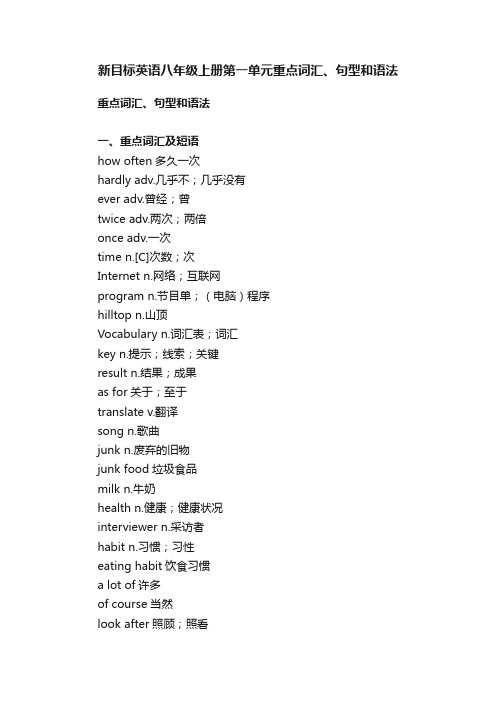
新目标英语八年级上册第一单元重点词汇、句型和语法重点词汇、句型和语法一、重点词汇及短语how often多久一次hardly adv.几乎不;几乎没有ever adv.曾经;曾twice adv.两次;两倍once adv.一次time n.[C]次数;次Internet n.网络;互联网program n.节目单;(电脑)程序hilltop n.山顶Vocabulary n.词汇表;词汇key n.提示;线索;关键result n.结果;成果as for关于;至于translate v.翻译song n.歌曲junk n.废弃的旧物junk food垃圾食品milk n.牛奶health n.健康;健康状况interviewer n.采访者habit n.习惯;习性eating habit饮食习惯a lot of许多of course当然look after照顾;照看difference n.不同;差异;区别make a difference使得结果不同;有重要性grade n.分数;年级;成绩unhealthy adj.不健康的;不益健康的yuck int.(表示反感、厌恶等)although=though conj.虽然;即使;纵然do表强调(位于实义动词前)skateboarding n.滑雪板运动start with以……开始二、重点句型和交际用语1.How often do you…?2.What do you usually do on weekends? I usually play soccer.What do they do on weekends? They often go to the movies.What does he do on weekends? He sometimes watches TV.How often do you shop? I shop once a month.How often does Chung watch TV? He watches TV twice a week.三、重要语法一般现在时的陈述句、特殊疑问句及其回答1.Some students do homework three or four times a week.2.A:How often do you watch TV?B:Twice a week.3.A:What does she do on weekends?B:She often goes to the movies.。
人教版八年级英语上册知识点总结和复习要点
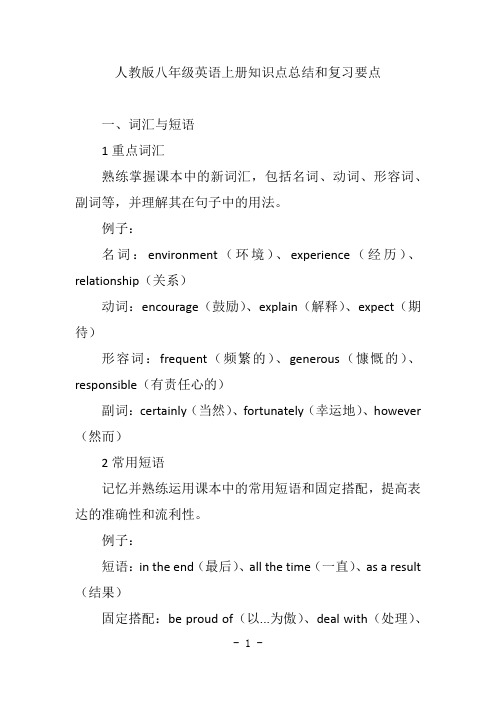
人教版八年级英语上册知识点总结和复习要点一、词汇与短语1重点词汇熟练掌握课本中的新词汇,包括名词、动词、形容词、副词等,并理解其在句子中的用法。
例子:名词:environment(环境)、experience(经历)、relationship(关系)动词:encourage(鼓励)、explain(解释)、expect(期待)形容词:frequent(频繁的)、generous(慷慨的)、responsible(有责任心的)副词:certainly(当然)、fortunately(幸运地)、however (然而)2常用短语记忆并熟练运用课本中的常用短语和固定搭配,提高表达的准确性和流利性。
例子:短语:in the end(最后)、all the time(一直)、as a result (结果)固定搭配:be proud of(以...为傲)、deal with(处理)、pay attention to(注意)二、句型与语法1基本句型熟练掌握五种基本句型,包括主语+谓语、主语+谓语+宾语、主语+谓语+间接宾语+直接宾语、主语+谓语+宾语+宾语补足语、主语+系动词+表语。
例子:主语+谓语:She sings.(她唱歌。
)主语+谓语+宾语:I like apples.(我喜欢苹果。
)主语+谓语+间接宾语+直接宾语:He gave me a book.(他给了我一本书。
)主语+谓语+宾语+宾语补足语:I found the book interesting.(我发现这本书很有趣。
)主语+系动词+表语:She is beautiful.(她很漂亮。
)2时态深入学习并掌握现在完成时、过去进行时、一般将来时、过去将来时等时态的用法和形式。
例子:现在完成时:I have already seen that movie.(我已经看过那部电影了。
)过去进行时:They were playing football when I called them.(我打电话给他们时,他们正在踢足球。
八年级英语上册第一单元语法知识点归纳
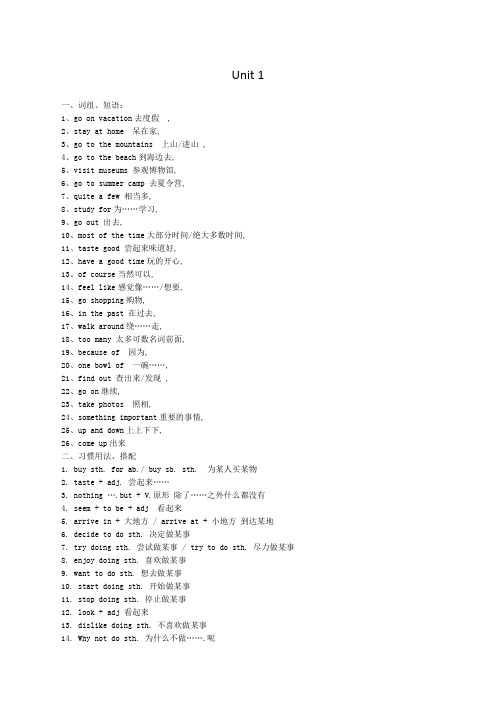
Unit 1一、词组、短语:1、go on vacation去度假 ,2、stay at home 呆在家,3、go to the mountains 上山/进山 ,4、go to the beach到海边去,5、visit museums 参观博物馆,6、go to summer camp 去夏令营,7、quite a few 相当多,8、study for为……学习,9、go out 出去,10、most of the time大部分时间/绝大多数时间,11、taste good 尝起来味道好,12、have a good time玩的开心,13、of course当然可以,14、feel like感觉像……/想要,15、go shopping购物,16、in the past 在过去,17、walk around绕……走,18、too many 太多可数名词前面,19、because of 因为,20、one bowl of 一碗……,21、find out 查出来/发现 ,22、go on继续,23、take photos 照相,24、something important重要的事情,25、up and down上上下下,26、come up出来二、习惯用法、搭配1. buy sth. for ab./ buy sb. sth. 为某人买某物2. taste + adj. 尝起来……3. nothing ….but + V.原形除了……之外什么都没有4. seem + to be + adj 看起来5. arrive in + 大地方 / arrive at + 小地方到达某地6. decide to do sth. 决定做某事7. try doing sth. 尝试做某事 / try to do sth. 尽力做某事8. enjoy doing sth. 喜欢做某事9. want to do sth. 想去做某事10. start doing sth. 开始做某事11. stop doing sth. 停止做某事12. look + adj 看起来13. dislike doing sth. 不喜欢做某事14. Why not do sth. 为什么不做…….呢15. so + adj + that + 从句如此……以至于……16. tell sb. not to do sth. 告诉某人不要做某事17. keep doing sth. 继续做某事18. forget to do sth. 忘记去做某事 / forget doing sth 忘记做过某事三、重点句子1. Where did you go on vacation 你去哪儿度假的1这是一个由疑问副词where引导的特殊疑问句;Where用来询问地点或场所,用于句首,其后跟一般疑问句;如:Where are you from Where does he live2go on vacation“去度假”He will go on vacation with his family. 他要和家人一起度假;解析 vacation v'ken n 假期 = holidayon vacation 在度假 take a vacation 去度假 winter vacation 寒假 summer vacation 暑假①I have a lot of _______________every year . vacation②— Where did Sarah go on vacation— She went to America.A.on vacationB. take a vacationC. is on vacationD. is for vacation2、Did you go with anyone你和别人一起去的吗这是一个一般过去时的一般疑问句;当含有实义动词的一般过去时的陈述句变为一般疑问句时,需借助助动词did,此时后面的实义动词应用原形;其句型结构为“did+主语+动词原形+其它”,肯定回答为“Yes,主语+did”,否定回答为“No,主语+didn′t”·基本用法pron. anyone 任何人,相当于anybody,通常用在否定句、疑问句或条件从句中;如: I wont tell anyone I saw you here. 我不会告诉任何人我在这儿见过你;Why would anyone want that job 为什么会有人想要那份工作呢知识拓展---同类词Some - any- no- every-指人 someone 有人 anyone 任何人 anybody no one 没有人nobody everyone 人人 everybody指物 something 某物 anything 任何事 nothing 没有事everything 一切事指地点 somewhere 某地 anywhere 任何地方 nowhere 无处,没有地方 everywhere 到处注意:1由some-, any-, no-, every-构成的符合不定代词作主语时,都作单数看待,其谓语动词用第三人称单数形式;2不定代词若有定语修饰,该定语要置于其后,作后置定语;如:Id like something to drink. 我想要些喝的;Is there anything interesting in the book 这本书中有有趣的东西吗小结:解析1someone smwn pron 某人anyone eniwn pron 任何人 everyone evriwn pron 每人,人人 my uncle 看望了我的叔叔visit是及物动词,意为“拜访;探望”,后接表示人的名词或代词; visit还可以意为“参观;游览”,后接表示地点的名词;a.I visited my grandmother last week. 上周我去______了我的外婆;b. you want to visit Shanghai 你想______上海吗c.拓展:visitor意为“参观者;游客”;These visitors come fromanything special 买特别的东西;P21buy及物动词,意为“买;购买”;其过去式为______;拓展:buy sth. for sb.=buy sb. sth. 意为“给某人买某物”; My uncle_____ _____a bike.= My uncle_____ _____for me.2)anything不定代词,意为“某事;某件东西”,主要用于疑问句或否定句中;a.Do you want to buy anything for me cant say anything about it.3)anthing special表示“特别的东西”,形容词修饰不定代词时后置;Is there________ ________in this book这本书里有新的内容吗, did you go anywhere interesting哦,你去有趣的地方了吗P21本句是did开头的一般疑问句2anywhere用作副词,意为“在任何地方”;eg:Did you go anywhere during the summer vacation 辨析:anywhere与somewhereanywhere意为“在任何地方”,常用于否定句和疑问句中; eg:I cant find it anywhere.somewhere意为“在某处;到某处”,常用于肯定句中; eg:I lost my key somewhere near here. took quite a few photos there.我们在那里拍了不少照片;P2take photos 意为“照相;拍照”; eg:We______ ______on the Great Wall.我们在长城上照了相;辨析:quite a few与quite a littlequite a few 意为“很多;不少”,修饰可数名词复数;quite a little 意为“很多;不少”,修饰不可数名词;a. He stays here for _____ _____ _____days.is _____ _____ _____water in the bottle瓶子.6. I just stayed at home most of the time to read and relax. 我大部分时间只是待在家里读书休息; P2most of the time意为“大部分时间”,其中most为代词,意为“大部分;大多数”拓展most of…意为“……中的大多数”,它作主语时,谓语动词取决于most of后所修饰的名词;of us_____begoing to the park. 我们大多数人要去公园;b. Most of the food_____gobad. 大部分的食物都变质了;7.Everything tasted really good所有的东西尝起来真的很好吃P3taste在此为系动词,意为“尝起来”,其后接形容词构成系表结构;a.The food tastes really great.食物尝起来棒极了;8. Did everyone have a good time大家都玩得很开心吗P3have a good time = enjoy oneself = have fun 玩得开心 + doingeg: We had a good time visiting the the Great Wall. = We enjoyed ourselves visiting the the Great Wall.= We had fun visiting the the Great Wall.did you like it 你觉得它怎么样P3How do/did you like……意为“你觉得……怎么样”,用来询问对方的观点或看法,相当What do you think of……eg: How do you like your new job = _____ _____ _____ _____ your new jobyou go shopping 你们去购物了吗P3go shopping意为“去购物;去买东西”,同义短语为do some shopping.eg: I usually go shopping on Sundays.我通常星期天去购物;拓展:“go+doing”形式表示“去做某事”,常用于表达从事某一体育活动或休闲活动;go skating 去滑冰go hiking 去远足 go sightseeing 去观光 go fishing 去钓鱼 go swimming 去游泳go boating 去划船went to a friends farm in the countryside with my family.我和家人一起去了乡下一个朋友的农场;P3a friend’s farm是名词所有格形式;一般情况下,表示“有生命的人或物”的名词后面加s,表示所属关系;eg:The red bike is Alices. 那辆红色的自行车是爱丽斯的;拓展:名词所有格的构成:1单数名词词尾加s ,复数名词词尾没有s,也要加sthe girl ‘s pen女孩的钢笔 women’s shoes女鞋 on Children’s Day2复数名词以s结尾的只加the students’ reading room学生阅览室 Teachers’ Day教师节3如果两个名词并列,并且分别有s,则表示“分别有”;只后一个名词有一个s,则表示“共有”:John’s and Kate’s rooms. 约翰和凯特各自的房间; Lily and Lucy’s father. 莉莉和露西的爸爸同一个爸爸; 4表示无生命的名词一般以...of...构成短语,表示所有关系;a map of China一幅中国地图 the name of the story那个故事的名字12.Still no one seemed to be bored. 即使这样仍然没有人看起来无聊;P31seem意为“好像;似乎;看来”;eg:Everything seems easy.一切似乎很容易;拓展 a. seem+adj. “看起来……”; You seem happy today.你今天看起来很高兴;b. seem+to do sth. “似乎,好像做某事”; I seem to have a cold.我似乎感冒了;=It seems that I have a cold.c. It seems/seemed+从句“看起来好像…;似乎…”;It seems that no one believes you.看起来好像没有人相信2辨析:bored与boringa. bored意为“厌烦的;感到无聊的”,一般在句中修饰人;b. boring意为“无聊的;令人厌烦的”,一般在句中修饰事或物;eg:a. I’m ______with what he said.我对他说的话厌烦极了;b. I find the story very_______.我发现这个故事太无聊了;二Section B1. What activities do you find enjoyable 你发现什么活动让人快乐P5enjoyable形容词,意为“愉快的;快乐的”;Im sure we will have an enjoyable vacation. 我确信我们将会有一个愉快的假期;2. I arrived in Penang in Malaysia this morning with my family. 今天早上我和家人到达了马来西亚的槟城;P5arrive不及物动词,意为“到达”;arrive in表示到达较大的地方,如国家、省、市等;arrive at表示到达较小的地方,如机场、商店、广场、村庄等;注:地点副词home,here,there前介词省略辨析:①arrive in+大地点 / arrive at+小地点②get to +地点③reach+地点eg:I 到达 school at 8:00 oclock yesterday.3. …so we decided to go to the beach near our hotel…因此我们决定到旅馆附近的海滩上去;P5 decide to do sth.意为“决定做某事”; eg: They _____ ______ ______the museum.他们决定去参观博物馆;拓展:decide后常跟“疑问词+动词不定式”做宾语;He can’t decide when ______ _____leave 他不能决定何时动身;4. My sister and I tried paragliding.姐姐和我尝试了滑翔伞运动;P5try此处用作及物动词,其后常接名词、动名词或不定式,意为“尝试;试图,设法;努力”She is trying my bicycle.她正在试骑我的自行车;拓展:try也可用作名词,意为“尝试”,常用短语“have a try”,意为“试一试”;I want to have a try.我想试一试;辨析:try doing sth. / try to do sth.1try doing sth. 尝试做某事,表示一种尝试、做做看的想法,不一定付出很多努力;2try to do sth.尽力、设法去做某事,表示想尽一切办法要把事情办成,强调付出努力设法去完成;a. I ______ ______ him, but no one answered. 我试着给他打电话了,但没有人接听;b. Im ______ ______ ______ English well. 我正尽力把英语学好;5. I felt like I was a bird. It was so exciting 我感觉自己就像一只小鸟;太刺激了P51feel like意为“给……的感觉;感受到”;其后常接从句; eg: He feels like he is swimming. 他感觉像在游泳一样;拓展:feel like还可意为“想要……”,其后可接名词、代词或动名词;即: feel like sth. 想要某物 feel like doing sth. 想要做某事 eg:Do you feel like a cup of tea now 你现在想要一杯茶吗Do you feel like ______ take a walk in the park with me 你想跟我在公园散步吗2辨析:exciting与excitedexciting 意为“令人兴奋的,使人激动的”, 一般修饰某物; excited 意为“感到兴奋的,激动的”, 一般修饰某人; Eg: story is_________exciting, excited .told me the_______exciting, excitednews.was_______exciting, excitedto see the singer.6.There are a lot of new buildings now…现在有许多新的建筑物……P5building 可数名词,意为“建筑物;楼房”;build 动词,“建造,建筑” built,built,The workers built many tall buildings in our school last year.7. I wonder what life was like here in the past. 我想知道在这儿过去的生活是什么样的;P5 wonder此处是及物动词,意为“想知道;琢磨”;其后常接who, what, why等疑问词引导的宾语从句;Eg: wonder _______________. 我想知道那个男孩是谁;A. the boy is who B. who the boy is 2. I wonder what they were doing here.我想知道他去哪里了;8.I really enjoyed walking around the town. 我真的很喜欢在镇上到处走走; P51enjoy及物动词,意为“喜爱;欣赏;享受……的乐趣”,其后接名词,代词或动名词作宾语;a. Do you enjoy your job 你喜欢你的工作吗b. I enjoy reading books. 我喜欢读书;enjoy doing sth.喜欢做某事拓展: enjoy oneself =have a good time = have fun 玩得开心 + doing sth.2)walk around 意为“四处走走”;Hes just walking around the village.他只是在村庄里随便走走;9. What a difference a day makes 一天的变化有多大呀 P5difference可数名词,意为“差别,差异”;其形容词形式为different,意为“不同的;有差异的”; Eg: a. What is the difference between this book and that bookb. My schoolbag is different from yours. be different from 意为“与……不同”10.We wanted to walk up to the top , but then it started raining a little so we decided to take the train.P51want to do sth. 意为“想要做某事”;2start doing sth. 意为“开始做某事”,同义短语:start to do sth. Eg: Tom started learning English last year.3a little 意为“一点儿”,在句中修饰动词、形容词或副词;也可以修饰不可数名词;Eg: a. I can draw a little, but only as a hobby. ______________________________b. Its a little cold outside. ______________________________c. He can speak a little English. ______________________________4)take the train意为“乘火车”,take在此意为“乘坐”;waited over an hour for the train because there were too many people. 因为人太多,所以我们等了一个多小时的火车;P51wait for意为“等候”,其后可接人或物; Tom was waiting for a bus over there.2over介词,意为“多于;超过” ,相当于more than; Eg : My father is over 40 years old.Here are over eight hundred students in our school.3 too many意为“太多”,其后接可数名词复数; He always has too many questions to ask me. 辨析:too many + 可数名词复数意为“太多... ”too much + 不可数名词意为“太多... ”much too + 形容词 /副词意为“太... ”eg:I have homework to do today. The weather today is ______ _______ cold. because of the bad weather, we couldnt see anything below.而且因为坏天气,我们也没能看到下面的任何景色P5辨析:because of与becausea. because of意为“因为,由于”,后可接名词短语、代词或动名词,不能接句子; He lost his job because of his age.b. because意为“因为”,引导状语从句,即接句子; I didnt buy the shirt because it was too expensive.13.My father didnt bring enough money…我爸爸没带足够的钱……P51辨析:bring与takebring意为“带来;拿来”, 指从别处带到说话者所在地;take意为“拿走;带走”, 指从说话者所在地带到别处去;2enough 意为“足够的,充分的”1.用来修饰形容词或副词,一般置于被修饰词之后;2.用来修饰名词时放在名词之前;Eg:a. We have enough time to do our homework.b. The box is big enough.14.…because we forgot to bring an umbrella…因为我们忘了带雨伞;P6辨析:forget to do sth.与forget doing sth.forget to do sth. 意为“忘记要做某事事情还没做”eg: Dont forget to close the window. forget doing sth. 意为“忘记做过某事事情已经做过了” eg: I forget closing the window. 15. About one hour later, we stopped and drank some tea. 大约一小时后,我们停下来喝了些茶;P6 1one hour later 一小时后;一小时前__________________2stop动词,意为“停止;中断”,过去式_________,现在分词__________;3drink及物动词,意为“喝;饮”;还可以作名词,意为“饮料”;16. Did you dislike anything 你不喜欢什么东西吗P7dislike意为“不喜欢;厌恶”,其后可接名词、代词或动名词形式作宾语;Eg:a. Mary ______ the hamburgers. 玛丽不喜欢汉堡包;b. I _____ ______ computer 我不喜欢玩电脑游戏;17. Why not 为什么不带呀P8why not意为“为什么不呢”,一般用在疑问句中,表示提建议;why not后面需跟动词原形;注“Why not + 动词原形”相当于“Why dont you+ 动词原形”a. Why not go to the party with me =Why dont you go to the party with me为什么不和我一起去参加聚会呢_____ take a walk = _____ ______ _____ take a walk 为什么不去散步呢in our class took a bag with some food and water. 我们班上的每一个人都随身带了装有食物和水的提袋;P8with介词,意为“具有;带有”; 此处介词短语with some food and water作bag的后置定语;拓展:with作介词时的其他用法:a.“和……一起’ I often go to school ______ my friend. 我经常和朋友们一起去上学;b. 以手段、材料,用工具, Cut the apple with a knife. 用刀切苹果;19. My legs were so tired that I wanted to stop. 我的双腿太累了以至于我都想停下来;P8so…that… / such…that…如此…以致引导的结果状语从句so+adj./adv.+that…Eg:1. He is ____lovely a boy____we love him very much.2.The little boy is so young that he can’t go to school.20. 常用的感叹句的结构:1What +adj.+ 复数名词 / 不可数名词+主语+谓语2What +a/an+adj.+可数名词单数+主语+谓语3How +adj. +a/an+可数名词单数+主语+谓语4How+adj./adv. +主语+谓语eg: an interesting book it is = How interesting a book is 那本书多么有趣啊clever girl she is3. _____clever a girl she isjobs they have donewater it is D. Howthe dog is C. Where D. How21. My classmates told me to keep going, so I went on. 我的同学告诉我坚持往前走,因此我便继续前进了P81tell sb. notto do sth. 意为“告诉某人不要做某事;The teacher ______ ______ ______ ______ the window just now. 老师刚才告诉我们擦窗户;2keep doing sth. 意为“继续做某事,一直做某事”;She______ ______ TV for two hours last night. 昨晚她持续看了两个小时的电视;23.Everyone jumped up and down in excitement. 大家都兴奋地跳起来;P8up and down 意为“上上下下;来来回回”,在句中作状语;Eg:They looked me ______ ______ ______. 他们上上下下打量我;He walks______ ______ ______ in the room. 他在房间里来回走动;22. 反身代词:myself , ourselves, yourself , yourselves, himself, herself, itself, themselves.作动词或介词的宾语:经常在enjoy, teach, hurt, buy, introduce, dress, kill等动词和by, for, to, of等介词后作宾语;一年主考宾语回自身He is teaching himself English.她在自学英语;She was talking to herself.她自言自语;He lives by himself in the country.他独自住在乡下;1)Help yourself 请随便吃吧/请自己去取吧2)2 Make yourself at home 别客气3)make yourself heard /understood. 使你的话被人听得见/理解4)4 teach oneself 自学=learn by oneself5)5 by oneself 独自6)for oneself 为自己;替自己7 enjoy oneself 玩的愉快8 dress oneself 给自己穿衣, little, a few, a little :的用法few, a few修饰可数名词,little, a little修饰不可数名词;few, little具有否定意义,表示“几乎没有”,a few, a little具有肯定意义,表示“一些”;He has little money, but few students want to lend money to him.他几乎没有钱,但是几乎没有学生想借钱给他;There is a little milk and a few apples left in the fridge.冰箱里还有一些牛奶和一些苹果;。
英语八年级上册第二单元知识点
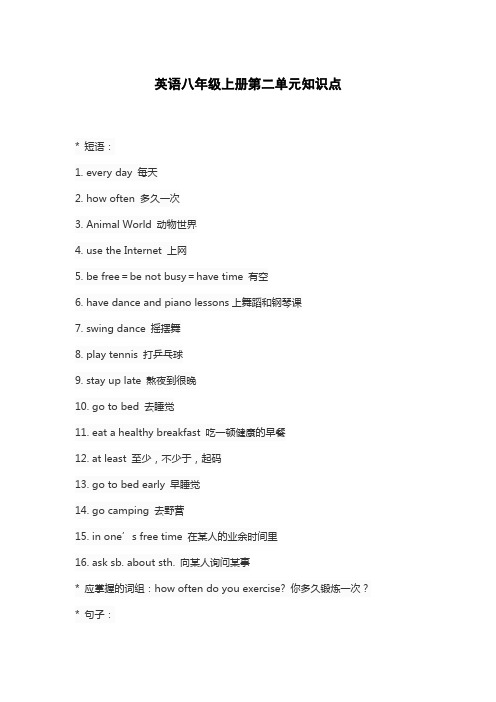
英语八年级上册第二单元知识点* 短语:1. every day 每天2. how often 多久一次3. Animal World 动物世界4. use the Internet 上网5. be free=be not busy=have time 有空6. have dance and piano lessons上舞蹈和钢琴课7. swing dance 摇摆舞8. play tennis 打乒乓球9. stay up late 熬夜到很晚10. go to bed 去睡觉11. eat a healthy breakfast 吃一顿健康的早餐12. at least 至少,不少于,起码13. go to bed early 早睡觉14. go camping 去野营15. in one’s free time 在某人的业余时间里16. ask sb. about sth. 向某人询问某事* 应掌握的词组:how often do you exercise? 你多久锻炼一次?* 句子:1. Do you have enough time to practice the piano every day? 你每天有足够的时间练钢琴吗?2. How often do you watch Animal World? 你多久看一次《动物世界》?3. I usually use the Internet to search for information about science. 我通常上网搜索科学方面的信息。
4. I am always free on weekends. 我总是在周末有空。
5. My sister has dance and piano lessons every day. 我妹妹每天上舞蹈课和钢琴课。
6. Last weekend, we went to a swing dance club and had a great time. 上周末,我们去了一个摇摆舞俱乐部,玩得很开心。
人教八年级英语上册语法
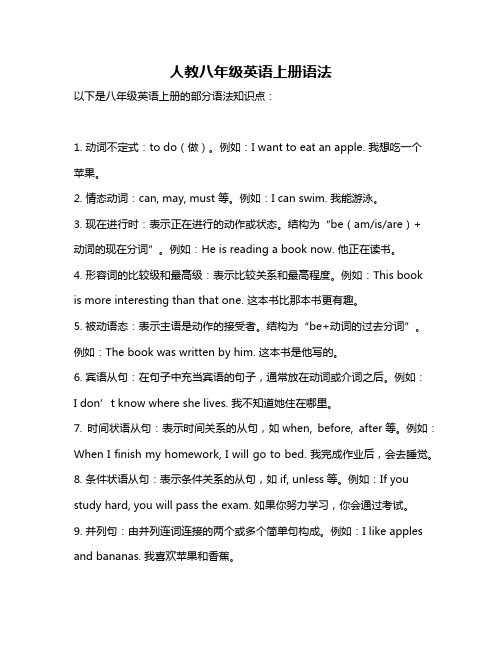
人教八年级英语上册语法以下是八年级英语上册的部分语法知识点:1. 动词不定式:to do(做)。
例如:I want to eat an apple. 我想吃一个苹果。
2. 情态动词:can, may, must 等。
例如:I can swim. 我能游泳。
3. 现在进行时:表示正在进行的动作或状态。
结构为“be(am/is/are)+动词的现在分词”。
例如:He is reading a book now. 他正在读书。
4. 形容词的比较级和最高级:表示比较关系和最高程度。
例如:This book is more interesting than that one. 这本书比那本书更有趣。
5. 被动语态:表示主语是动作的接受者。
结构为“be+动词的过去分词”。
例如:The book was written by him. 这本书是他写的。
6. 宾语从句:在句子中充当宾语的句子,通常放在动词或介词之后。
例如:I don’t know where she lives. 我不知道她住在哪里。
7. 时间状语从句:表示时间关系的从句,如when, before, after等。
例如:When I finish my homework, I will go to bed. 我完成作业后,会去睡觉。
8. 条件状语从句:表示条件关系的从句,如if, unless等。
例如:If you study hard, you will pass the exam. 如果你努力学习,你会通过考试。
9. 并列句:由并列连词连接的两个或多个简单句构成。
例如:I like apples and bananas. 我喜欢苹果和香蕉。
以上是部分语法知识点,建议咨询专业英语教师,获取更准确的信息。
八年级上册英语语法知识点讲解和练习(学生用)
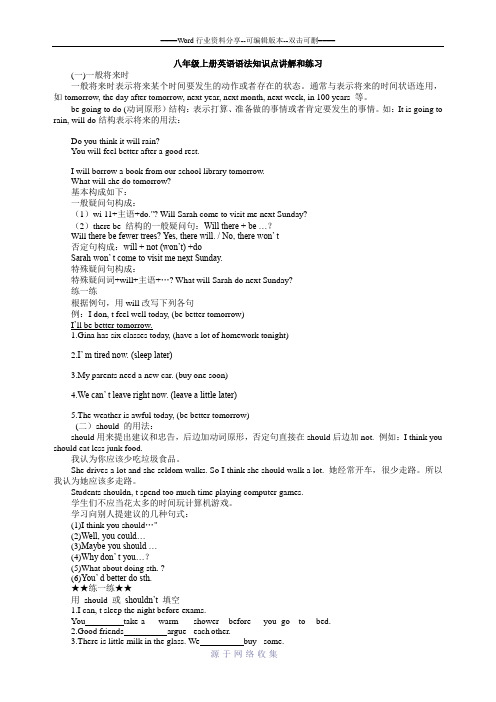
八年级上册英语语法知识点讲解和练习(一)一般将来时一般将来时表示将来某个时间要发生的动作或者存在的状态。
通常与表示将来的时间状语连用,如tomorrow, the day after tomorrow, next year, next month, next week, in 100 years 等。
be going to do (动词原形)结构:表示打算、准备做的事情或者肯定要发生的事情。
如:It is going to rain, will do结构表示将来的用法:Do you think it will rain?You will feel better after a good rest.I will borrow a book from our school library tomorrow.What will she do tomorrow?基本构成如下:一般疑问句构成:(1)wi 11+主语+do."? Will Sarah come to visit me next Sunday?(2)there be 结构的一般疑问句:Will there + be …?Will there be fewer trees? Yes, there will. / No, there won’ t否定句构成:will + not (won’t) +doSarah won’ t come to visit me next Sunday.特殊疑问句构成:特殊疑问词+will+主语+…? What will Sarah do next Sunday?练一练根据例句,用will改写下列各句例:I don, t feel well today, (be better tomorrow)I’ll be better tomorrow.1.Gina has six classes today, (have a lot of homework tonight)2.I’ m tired now. (sleep later)3.My parents need a new car. (buy one soon)4.We can’ t leave right now. (leave a little later)5.The weather is awful today, (be better tomorrow)(二)should 的用法:should用来提出建议和忠告,后边加动词原形,否定句直接在should后边加not. 例如:I think you should eat less junk food.我认为你应该少吃垃圾食品。
八年级上册英语unit1-3知识点及语法
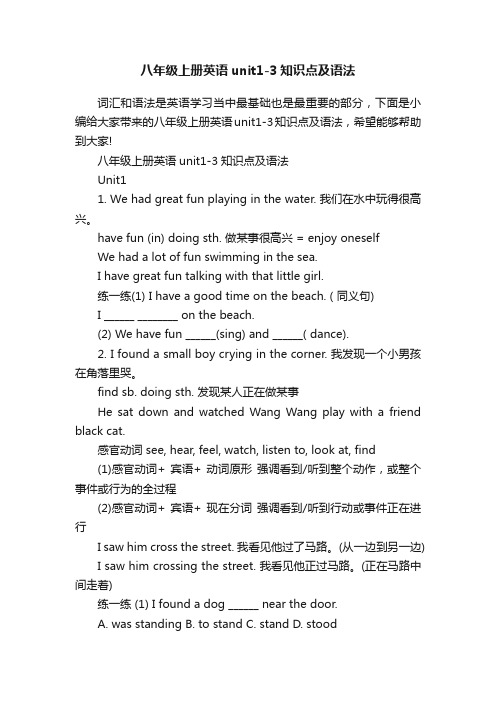
八年级上册英语unit1-3知识点及语法词汇和语法是英语学习当中最基础也是最重要的部分,下面是小编给大家带来的八年级上册英语unit1-3知识点及语法,希望能够帮助到大家!八年级上册英语unit1-3知识点及语法Unit11. We had great fun playing in the water. 我们在水中玩得很高兴。
have fun (in) doing sth. 做某事很高兴 = enjoy oneselfWe had a lot of fun swimming in the sea.I have great fun talking with that little girl.练一练(1) I have a good time on the beach. ( 同义句)I ______ ________ on the beach.(2) We have fun ______(sing) and ______( dance).2. I found a small boy crying in the corner. 我发现一个小男孩在角落里哭。
find sb. doing sth. 发现某人正在做某事He sat down and watched Wang Wang play with a friend black cat.感官动词 see, hear, feel, watch, listen to, look at, find(1)感官动词+ 宾语+ 动词原形强调看到/听到整个动作,或整个事件或行为的全过程(2)感官动词+ 宾语+ 现在分词强调看到/听到行动或事件正在进行I saw him cross the street. 我看见他过了马路。
(从一边到另一边)I saw him crossing the street. 我看见他正过马路。
(正在马路中间走着)练一练 (1) I found a dog ______ near the door.A. was standingB. to standC. standD. stood(2) She heard a little boy ______ English.A. readingB. readsC. to readD. is reading3. That made me feel very happy. 那使我感到很愉快。
新人教新目标版八年级英语上册短语语法知识点汇总

人教版八年级英语上册短语语法知识点总结初二英语课组2019年[由我校初二英语科组根据最新考纲和近几年中考的趋势加上我校学生的实际情况,结合初二全体英语科组的力量,汇编了这一份重点总结,编好一份学案不易,望同学们能好好利用。
]Unit 1 Where did you go on vacation一、必背单词短语。
Section A1.Where did you go on vacation? (P. 1)on vacation意为“在度假”,结构“on+名词”表示“在某种状态中”。
例句:My family went to Hainan on vacation last year.2....visited my uncle (P. 1)visit此处用作及物动词,后接人或物做宾语,意为“拜访、看望”,后接表示地点的名词,意为“参观、游览”。
例句:I visited my grandmother last week.例句:Do you want to visit Shanghai?3....go with anyone? (P. 2)(1)anyone用作不定代词,意为“有人、任何人”,相当于anybody,用于疑问句和否定句中,在肯定句中用someone或者somebody。
但是anyone也可以用在肯定句中,表示“任何一个人”。
例句:Did you meet anyone friendly in that city?例句:Anyone can be helpful in some way.(2)anyone只能指人,不可以指物,后面不接of短语;any one既可以指人也可以指物,后可接of短语。
例句:You can ask any one of us about this question.4....buy anything special? (P. 2)(1)buy用作双宾语动词,表示“买”,常用的结构为“buy sb. sth.”或者“buy sth. for sb.”,表示“为某人买某物”。
译林版八年级英语上册语法知识概述

译林版八年级英语上册语法知识概述
本文将概述译林版八年级英语上册的语法知识。
下面是各个单
元的重点语法内容:
Unit 1
- 一般现在时:表示经常性、习惯性的动作或状态。
- 现在进行时:表示正在进行的动作。
- 一般过去时:表示过去某个时间发生的动作或存在的状态。
- 现在完成时:表示过去发生的动作对现在造成的影响或结果。
Unit 2
- 一般将来时:表示将来某个时间会发生的动作或存在的状态。
Unit 3
- 一般过去时的被动语态:表示动作的承受者比较重要或者不
知道动作的执行者是谁。
- 现在进行时的被动语态:表示正在进行的动作的承受者比较
重要或者不知道动作的执行者是谁。
Unit 4
- 一般过去时的疑问句:用于询问过去发生的动作或存在的状态。
- 现在完成时的疑问句:用于询问过去发生的动作对现在造成的影响或结果。
Unit 5
- 一般过去时的否定句:表示否定过去发生的动作或存在的状态。
- 现在完成时的否定句:表示否定过去发生的动作对现在造成的影响或结果。
Unit 6
- 一般将来时的疑问句:用于询问将来某个时间会发生的动作或存在的状态。
Unit 7
- 现在完成时的疑问句:用于询问过去发生的动作对现在造成的影响或结果。
Unit 8
- 一般将来时的否定句:表示否定将来某个时间会发生的动作或存在的状态。
以上是译林版八年级英语上册的语法知识概述,希望对你的学习有所帮助。
英语八年级上册重点知识点

英语八年级上册重点知识点英语八年级上册是中学英语学习的重要阶段,是学生打好英语基础的关键时期。
在这个阶段,学生会学习很多重要的知识点,这些知识点会在以后的学习中发挥重要的作用。
下面,我们就来介绍一下英语八年级上册的重点知识点。
一、语法知识点1.一般过去时:表示过去某个时间或事件发生的情况。
动词规则变化一般是在动词词尾加-ed。
2.现在进行时:表示现在正在进行的动作。
动词规则变化一般是在动词词尾加-ing。
3.一般现在时:表示经常性的或习惯性的动作。
动词变化规则一般是在第三人称单数形式加-s或者-es。
4.情态动词:表示说话人的态度、观点或能够进行的行为。
如:can、could、may、might、must、should、ought to。
5.被动语态:表示动作的承受者或者被动者。
变化规则一般是将be动词和过去分词构成。
二、词汇知识点1.常见词汇:包括日常生活用语、交通工具、食物等方面的词汇。
2.同义词汇:表示相同或相近的含义的词汇。
如:big和large。
3.反义词汇:表示相反含义的词汇。
如:up和down。
4.近义词汇:与某个单词相似但不完全相同的词汇。
如:cow和cattle。
5.词根词缀:表示词汇的来源和变化方式。
如:re-表示“再一次”,-ful表示“充满”。
三、句型知识点1.定义句:用来定义一个事物的句子。
2.疑问句:用来询问事情或事件。
3.否定句:否定一个事物或事件。
4.感叹句:表达强烈的情感或者惊讶。
5.条件句:表示一个条件和结果之间的关系。
四、阅读技巧1.主题识别:通过阅读文章的第一段或者最后一段,找出主题或者主旨。
2.细节理解:注意细节特征,抓住重点句子,确定关键信息。
3.推理:通过阅读文章内容和背景知识推断文章信息。
4.推断:从文章中推测出作者的态度、观点和意图。
5.识别语气:注意文章中的情绪和语气,看出作者的观点。
以上就是英语八年级上册的重点知识点。
学生们在学习过程中,可以针对这些知识点进行练习和掌握,相信英语学习会越来越简单。
八年级上册英语一二单元知识点

八年级上册英语一二单元知识点八年级上册英语一二单元知识点考点英语是国际通用语言,掌握英语可以更好地进行国际交流,拓展人际关系。
那么,以下是我为大家带来的八年级上册英语一二单元知识点考点,欢迎参阅呀!八年级上册英语一二单元知识点考点Unit 1.How often do you exercise?I. 重点短语归纳:on weekends 在周末1. go to the movies 去看电影2. look after=take care of 照顾3. surf the internet 上网4. healthy lifestyle 健康的生活方式5. go skateboarding 去滑滑板watch TV看电视6. keep healthy=stay healthy = keep in good health 保持健康 keep + 形容词表保持某种状态do some reading 阅读7. exercise= take/do (much) exercise=do sports锻炼8. eating habits 饮食习惯9. take more exercise 做更多的运动10. the same as 与什么相同11. once a month一月一次12. be different from 不同13. twice a week一周两次.three times a week一周三次14. make a difference to 对什么有影响As teachers, you must believe that you can make a difference to the lives of your students.身为教师,你们必须坚信你们能够影响学生的一生。
A false step will make a great difference to my future.错走一步对我的前程来说会产生很大影响。
人教版英语八年级上册第三单元短语语法知识点总结

Unit3I’mmoreoutgoingthanmysister 一、词组、短语:01.moreoutgoing更外向/更开朗,02.as...as...与……一样,03.thesingingcompetition歌咏比赛,04.themostimportant最重要的,05.betalentedinmusic在音乐方面有天赋,06.thesameas与……相同07.careabout关心/留意/关注,08.bedifferentfrom与…不同,09.belikeamirror像一面镜子,10.aslongas与…一样长,11.bringout显示/显出/生产/带来,12.getbettergrade取得好成绩,13.reachfor伸手达到/达到14.touchone’sheart感动,15.infact事实上,16.makefriends交朋友,17.begoodat在某方面成绩好,18.theother另一个,19.besimilarto对…熟悉,20.begoodwith与…和睦相处二、重要句子:01.SamhaslongerhairthanTom.萨姆的头发比汤姆的长。
02.ShealsosingsmoreloudlythanTara.她唱歌也比泰拉声音大。
03.Nellysangsowell.内莉唱得如此好。
04.Forme,agoodfriendlikestodothesamethingsasme.对于我来说,好朋友喜欢跟我做相同的事情。
05.Whoissmarter,yourmotheroryourfather谁更聪明,你妈妈还是你爸爸?06.It’snotnecessarytobethesame.没有必要相同。
07.Ithinkagoodfriendmakesmelaugh.我认为好朋友会让我笑。
08.Mollystudiesharderthanherbestfriend.莫莉比她更好的朋友学习更努力。
人教版八年级英语上册Unit8词汇语法句型及练习题 句型透视
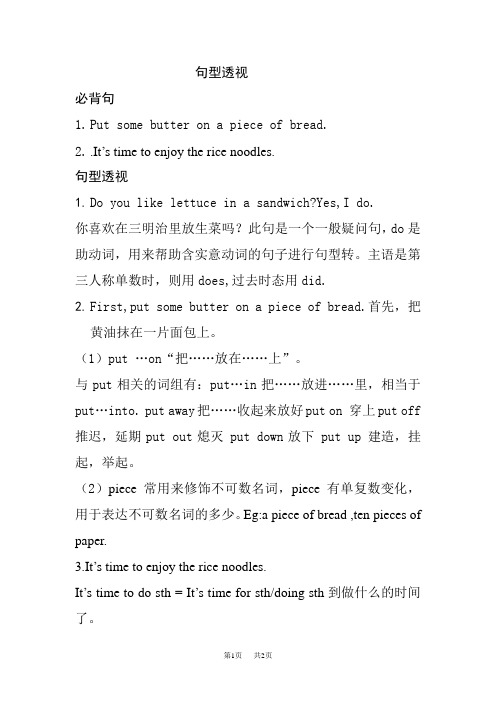
句型透视
必背句
1.Put some butter on a piece of bread.
2..It’s time to enjoy the rice noodles.
句型透视
1.Do you like lettuce in a sandwich?Yes,I do.
你喜欢在三明治里放生菜吗?此句是一个一般疑问句,do是助动词,用来帮助含实意动词的句子进行句型转。
主语是第三人称单数时,则用does,过去时态用did.
2.First,put some butter on a piece of bread.首先,把
黄油抹在一片面包上。
(1)put …on“把……放在……上”。
与put相关的词组有:put…in把……放进……里,相当于put…into. put away把……收起来放好put on 穿上put off 推迟,延期put out熄灭 put down放下 put up 建造,挂起,举起。
(2)piece 常用来修饰不可数名词,piece 有单复数变化,用于表达不可数名词的多少。
Eg:a piece of bread ,ten pieces of paper.
3.It’s time to enjoy the rice noodles.
It’s time to do sth = It’s time for sth/doing sth到做什么的时间了。
人教版英语八年级上册第二单元短语语法知识点总结

Unit 2 How often do you exercise?一、词组、短语:01、help with housework 帮助做家务活,02、go shopping 购物,03、on weekends 在周末,04、how often 多久一次,05、hardly ever几乎不,06、once a week 每周一次,07、twice a month每月二次,08、go to the movies去看电影,09、every day 每天,10、use the Internet上网/用网,11、be free有空,12、have dance and piano lessons 上舞蹈钢琴课,13、swing dance摇摆舞14、play tennis 打网球,15、stay up late熬夜,16、at least至少,17、go to bed early 早睡,18、play sports 锻炼身体,19、be good for 对…有好处,20、go camping去野营,21、in one’s free time 在某人的空闲时间,22、not….at all 根本不,23、the most popular 最流行,24、such as例如,25、go to the dentist去看牙医,26、more than 超过/多于,27、Old habits die hard.旧习惯难改。
28、hard=difficult 困难的,29、less than 少于/不到二、重要句子(语法):What do you usually do on weekends?你周末通常做什么?I always exercise.总是锻炼身体。
What do they do on weekends?他们周末干什么?They often help with housework.他们经常帮助干家务活。
What does she do on weekends? 她周末干什么?She sometimes goes shopping.她有时购物。
(完整版)英语八年级上册短语重点句子语法归纳及练习
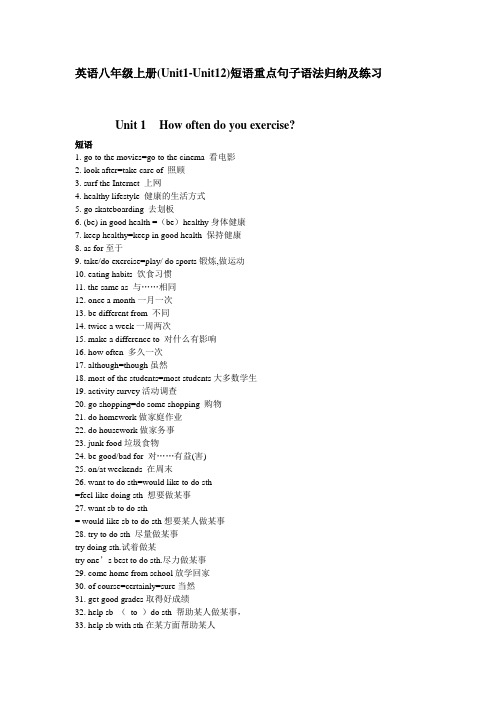
英语八年级上册(Unit1-Unit12)短语重点句子语法归纳及练习Unit 1How often do you exercise?短语1. go to the movies=go to the cinema 看电影2. look after=take care of 照顾3. surf the Internet 上网4. healthy lifestyle 健康的生活方式5. go skateboarding 去划板6. (be) in good health =(be)healthy身体健康7. keep healthy=keep in good health 保持健康8. as for至于9. take/do exercise=play/ do sports锻炼,做运动10. eating habits 饮食习惯11. the same as 与……相同12. once a month一月一次13. be different from 不同14. twice a week一周两次15. make a difference to 对什么有影响16. how often 多久一次17. although=though虽然18. most of the students=most students大多数学生19. activity survey活动调查20. go shopping=do some shopping 购物21. do homework做家庭作业22. do housework做家务事23. junk food垃圾食物24. be good/bad for 对……有益(害)25. on/at weekends 在周末26. want to do sth=would like to do sth=feel like doing sth 想要做某事27. want sb to do sth= would like sb to do sth想要某人做某事28. try to do sth 尽量做某事try doing sth.试着做某try one’s best to do sth.尽力做某事29. come home from school放学回家30. of course=certainly=sure当然31. get good grades取得好成绩32. help sb (to )do sth 帮助某人做某事,33. help sb with sth在某方面帮助某人34. a lot of =lots of=many /much许多,大量的2. 频度副词:always usually often sometimes hardly ever hardly nevertwice a month对以上提问用?3.重点句子:1.What do you usually do on weekends? I usually play soccer.2.How often do you shop? I shop once a month.3.Here are the results of the activity survey.4.She says it is good for my health.5.How many hours do you sleep every night?6.My eating habits are pretty good.7.I try to eat a lot of vegetables.8.I eat fruit and drink milk.9.I sleep 9 hours every night.10.My healthy lifestyle helps me get good grades.11.Is here lifestyle the same as yours or different?12.What are the differences.13.I think I am kind of unhealthy.14.What sports do you play?15.You must try to eat less meat.16. I go to meet my friends twice a week.语法:1.区分how often/far/long/soon 其中:how far 指路程;how long 指时间,答语用for+时间段, since+时间点; how soon 指时间,答语用in+时间段,用于一般将来时2. although = though 不与but 连用。
人教版八年级上册英语知识点(单词短语句子语法练习)

人教版八年级上册英语知识点(单词短语句子语法练习)人教版八年级上册英语知识点(单词、短语、句子、语法、练习)第1单元你去哪里度假了?单词anyone['eniw?n]pron.任何人任何地方,任何地方【同】【例】任何地方,任何地方【例】辉煌的;优秀的少数[fju?]形容词。
很少的n、少量的多数的;少量的;最某物['s?mθ??]表示某事;nothing(=not…anything)['n?θ??]pron.没有什么n.没有myself[ma?'self]pron.我自己everyone['evriw?n]pron.每人;人人yourself[j??'self]pron.你自己;你亲自hen[hen]n.母鸡;雌禽无聊的,无聊的。
毫无意义;无聊的抑郁猪diary['da??ri]n.日记;日记簿(keepadiary)seem[si?m]vi.似乎;好像某人,某人;有人放弃了很多;许多(后面跟着可数名词)当然,活动;忙碌的decide[d?'sa?d]v.决定;选定(decidetodosth.)试试[tra?]v、尝试;尝试试着做某事鸟;鸟;鸟paragliding['p?r?la?d??]n.空中滑翔跳伞bicycle['ba?s?kl]n.自行车building['b?ld??]n.建筑物trader['tre?d?(r)]n.商人;商船惊奇【同】【例】惊奇;想知道怀疑差异【同】【例】差异;不同的上衣【t?P】n.上衣;顶部wait[we?t]v.等;等待(waitfor)umbrella[?m'brel?]n.伞;雨伞潮湿的;潮湿的。
潮湿的阴雨的below[b?'l??]prep.低于;在...下面adv.在下面as[?z]conj.如同;像...一样够了,够了。
够了;鸭,鸭n.鸭肉;鸭子hungry(反full)['h??ri]adj.饥饿的;渴望的feellike(doingsth.)想要不喜欢[D?S'lak]v;不喜欢;不喜欢;憎恨恶心的关键词1.goonvacation去度假2.stayathome待在家里3.gotothemountains去爬山4.gotothebeach去海滩5.visitmuseums参观博物馆6.gotosummercamp去参加夏令营7.quiteafew相当多8.studyfor为……而学习9.goout出去10.大多数时候11.味道很好12.当然过得很愉快14.feellike给……的感觉;感受到15.goshopping去购物16.在过去的17周中,由于一碗。
外研社八年级上册英语 Module 1 词汇和语法基础(解析版)
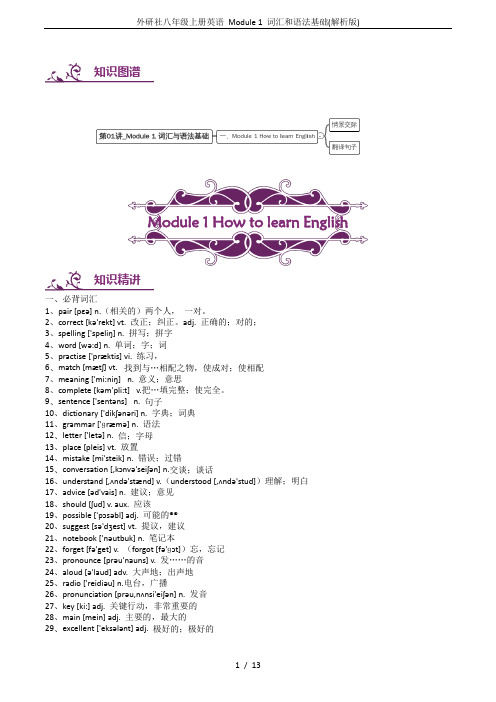
知识图谱Module 1 How to learn English知识精讲一、必背词汇1、pair [pεə] n.(相关的)两个人,一对。
2、correct [kə'rekt] vt. 改正;纠正。
adj. 正确的;对的;3、spelling ['speliŋ] n. 拼写;拼字4、word [wə:d] n. 单词;字;词5、practise ['præktis] vi. 练习,6、match [mætʃ] vt.找到与…相配之物,使成对;使相配7、meaning ['mi:niŋ]n. 意义;意思8、complete [kəm'pli:t]v.把…填完整;使完全。
9、sentence ['sentəns]n. 句子10、dictionary ['dikʃənəri] n. 字典;词典11、grammar ['ɡræmə] n. 语法12、letter ['letə] n. 信;字母13、place [pleis] vt. 放置14、mistake [mi'steik] n. 错误;过错15、conversation [,kɔnvə'seiʃən] n.交谈;谈话16、understand [,ʌndə'stænd] v.(understood [,ʌndə'stud])理解;明白17、advice [əd'vais] n. 建议;意见18、should [ʃud] v. aux. 应该19、possible ['pɔsəbl] adj. 可能的®®20、suggest [sə'dʒest] vt. 提议,建议21、notebook ['nəutbuk] n. 笔记本22、forget [fə'get] v. (forgot [fə'ɡɔt])忘,忘记23、pronounce [prəu'nauns] v. 发……的音24、aloud [ə'laud] adv. 大声地;出声地25、radio ['reidiəu] n.电台,广播26、pronunciation [prəu,nʌnsi'eiʃən] n. 发音27、key [ki:] adj. 关键行动,非常重要的28、main [mein] adj. 主要的,最大的29、excellent ['eksələnt] adj. 极好的;极好的30、agree [ə'ɡri:] vt. 同意;赞同31、quickly ['kwikli] adv. 迅速地;快地32、vocabulary [vəu'kæbjuləri] n. 词汇;词汇量33、natural ['nætʃərəl] adj. 合理的;合乎常情的34、improve [im'pru:v]vt. 改善,改进35、basic ['beisik] adj. 主要的;基础的36、time [taim] n. 回;次37、advise [əd'vaiz] vt.向…提出意见;忠告38、shy [ʃai] adj. 害羞的;腼腆的二、重点词汇1. suggest verb /səˈdʒest/to mention an idea, possible plan, or action for other people to consider提议;建议1). I suggested an Italian restaurant near the station for the party.我建议聚会去火车站附近的一家意大利餐馆。
八年级上册英语必会知识点

八年级上册英语必会知识点八年级上册英语是初中英语的重要学期之一,是学生进入高中的门槛。
在这一学期中,学生需要掌握许多英语基础知识,并能运用到实践中去。
本文将为大家列出八年级上册英语必会的知识点。
一、基础语法
1. 时态:
八年级上册英语要求掌握过去式、现在完成时、一般将来时、现在进行时等基本时态的用法及构成。
2. 语态:
被动语态是本学期的重点内容之一。
学生需掌握被动语态的构成及用法。
3. 句型:
疑问句、祈使句、感叹句等基本句型的用法及构成。
二、词汇
1. 单词:
掌握本学期的单词列表,包括与学科相关的名词、动词、形容词和副词等。
2. 短语:
学会运用习惯用语、固定短语、常用成语和俚语等。
3. 同义词和反义词:
必须学会掌握同义词和反义词,并能够在日常生活和写作中准确运用。
三、阅读和写作
1. 阅读:
学会理解基本的文章结构、模式及语言特点,并能识别主旨、概括和细节。
2. 写作:
能掌握简单句、复合句和复杂句的写法,并在写作过程中正确使用基本的标点符号。
四、口语和听力
1. 口语:
学习英语发音,掌握口语表达能力以及基础对话的运用。
2. 听力:
听力能力是英语学习中非常重要的一环,学生需要通过听力材料的练习提高自己的听力水平。
总结
八年级上册英语是英语基础知识的阶段,掌握好本学期的知识对于后续的学习和考试都非常重要。
除了上述重点知识点,学生还需要积累大量的词汇和短语,增强听力和口语能力,并通过阅读和写作提高自身的英语素养。
- 1、下载文档前请自行甄别文档内容的完整性,平台不提供额外的编辑、内容补充、找答案等附加服务。
- 2、"仅部分预览"的文档,不可在线预览部分如存在完整性等问题,可反馈申请退款(可完整预览的文档不适用该条件!)。
- 3、如文档侵犯您的权益,请联系客服反馈,我们会尽快为您处理(人工客服工作时间:9:00-18:30)。
新目标八年级(上)英语学习知识点(全)Unit 1: How often do you exercise? 【应掌握的词组】1. go to the movies 去看电影2. look after = take care of 照顾3. surf the internet 上网4. healthy lifestyle 健康的生活方式5. go skate boarding 去划板6. keep healthy=stay healthy 保持健康7.exercise=take(much)exercise=do sports锻炼8. eating habits 饮食习惯9. take more exercise 做更多的运动10. the same as 与什么相同11. be different from 不同12. once a month一月一次13. twice a week一周两次14. make a difference to 对什么有影响15. how often 多久一次16. although = though虽然17. most of the students=most students18. shop=go shopping=do some shopping 购物19. as for至于20. activity survey活动调查21. do homework做家庭作业22. do house work做家务事23. eat less meat吃更少的肉24. junk food垃圾食物25. be good for 对什么有益26. be bad for对什么有害27. want to do sth 想做某事28. want sb to do sth想某人做某事29. try to do sth 尽量做某事30. come home from school放学回家31. of course = certainly = sure当然32. get good grades取得好成绩33. some advice34. hardly=not nearly / almost not几乎不35. keep/be in good health保持健康36.be stressed紧张的,有压力的37. take a vacation 去度假48.get back 回来Unit 2 What’s the matter?●【重点词汇】● head, nose, eye, ear, tooth, neck, stomach, back, leg, arm, foot, throat ● thirsty, stressed out,/ dentist, lie, rest, honey, water, illness, advice.● cold, fever, headache, toothache, stomachache, sore throat 【应掌握的词组】1. Have a cold 感冒2. sore back 背痛3. neck and neck 并驾齐驱,齐头并进4. I have a stomachache 我胃痛= I have got a stomachache= There is something wrong with my stomach= My stomach hurts= I have (got) a pain in my stomach 5. What’s the matter? 怎么了?= What’s the trouble (with you)?= What’s your trouble?= What’s wrong (with you)?= What’ the matter (with you)?=What has happened to you?= Is there anything wrong (with you)? = what’s up?6. sore throat 咽喉痛7. lie down and rest 躺下休息8. see a dentist 看牙医9. drink lots of water 多喝水10. hot tea with honey 加蜂蜜的热茶11.That’s a good idea 好主意12.That’s too bad 太糟糕了13.I think so 我认为如此14. I’m not feeling well. 我觉得不太舒服= I’m not feeling fine/all right.= I’m feeling ill/sick. =I feel terrible/bad.= I don’t feel well.15. get some rest 多休息16. I have no idea = I don’t know 我不知道17. stressed out 筋疲力尽18. I am tired 我累了He is tired. 他累了19. a healthy lifestyle健康的生活方式20. traditional Chinese doctors传统中医21. a balance of yin and yang阴阳调和22. you have too much yin.你阴气太盛23. to eat a balance diet饮食平衡24. healthy food 健康食品25. stay healthy 保持健康=keep healthy=keep in good health= keep fit26. enjoy oneself (myself, yourself, herself,himself, themselves, ourselves, itself反身代词) 玩得高兴,过得愉快=have a good time = have a wonderful time= have fun27. enjoy sth. =like sth. (名词)喜欢某物,enjoy doing sth.喜欢做某事=like dong sthpractice doing sth.练习做某事,mind doing sth. 介意做某事,finish doing sth.完成某事,give up doing sth.放弃做某事,can’t help doing sth.忍不住做某事,keep ding sth. 坚持做某事. (keep on doing sth. / keep sb. doing sth. )be busy doing sth. 忙着做某事be used to doing sth.习惯于做某事make a contribution to doing sth.为..做贡献go on doing sth. 继续做某事forget doing sth.忘记做某事remember doing sth. 记得做某事spend....(in) doing sth. 花(时间)来做某事prefer doing sth.to doing sth.比起(做...)来更愿意(做...)28. at the moment = now 此刻29. Host family 东道家庭30. Conversation practice会话练习31. I’m sorry to hear that.听到此事我很难过Unit 3 What are you doing for vacation? 【应掌握的词组】1. babysit one’s sister 照顾妹妹2. visit one’s grandmother 看望奶奶3. spend time with friends 和朋友们一起度过时光4. visit cousins 看望表弟等5. go to sports camp 去运动野营6. o to the beach 去海滩7. go camping 去野营8. Go shopping 去买东西9. go swimming 去游泳10. go boating去划船11. go skating 去溜冰12. go walking去散步13. go climbing 去登山14. go dancing去跳舞15. go hiking 去徒步远足16. go sightseeing 去观光17. go house-hunting 去找房子18. o on a hike 徒步旅行,go bike riding 骑自行车旅行,go fishing 去钓鱼19. do some shopping 买东西20. do some washing 洗衣服21. do some cooking 作饭22. do some reading 读书23. do some speaking训练口语24. do some sewing 做缝纫活25. that sounds nice 那好极了26. at home 在家27. how about=what about ……怎么样?28. how long 多长时间29. how far 多远30. how often 多长时间一次31. how much, how many 多少32. have a good time=have fun= have a wonderful time= enjoy oneself 玩得高兴,过得愉快33. show sb. Sth.=show sth. to sb.出示某物给某人看give me the book=give the book to me 给我书,pass me the cup=pass the cup to me 把杯子递给我,sell me the house=sell the house to me 把房子卖给我buy me a book =buy a book for me 给我买书,make me a cake = make a cake for me 给我做蛋糕34. get back=come back回来35. rent videos租借影碟36. take walks=go for a walk散步37. think about 考虑38. decide on= decide upon决定一个计划39. something different 不同的事情40.a great vacation 一个愉快的假期41. I can’t wait 我等不及了42. the famous movie star 著名的影星43. an exciting vacation 激动人心的假期44. Ask her about her plans 向她询问她的计划ask sb. about sth.向某人询问某事45. forget to do sth. 忘记要做某事forget doing sth. 忘记做过某事Unit 4 How do you get to school? 【重点词汇】● get to, how far./ bicycle, subway, car, train.●bus stop, train station, bus station, subway station● minute, kilometer, mile, transportation , calendar【应掌握的词组】1. get to school 到校2. get home 到家3. how about=what about .怎么样?4. take the subway 乘地铁5. ride a bike 骑自行车6. take the bus乘公共汽车7. take the train乘火车8. take a taxi乘坐出租车9. go in a parent’s car 坐父母的车10. by bike, bike bus, by subway, by taxi, by car, by train(乘坐……车,放在句尾)11. have a quick breakfast 迅速吃早饭12. the early bus 早班车13. how far多远14. take sb. to sp.带某人到某处15. doing sth. takes sb. Some time/ money=It takes sb. some time/money to do sth.=sb. spends some time/money (on sth.)=sb. spends some time/money (in) doing sth.=sth. costs sb. some time/money=sb. pay some money for sth.花费某人多少时间/金钱做某事/某人花费多少金钱/时间做某事16. bus stop公共汽车站,train station火车站,subway station地铁站,bus station客运站17. want to do sth.想做某事18. walk to school 步行上学19. in North America 在北美20. in other parts of the world 在世界的其他地区21. depend on=depend upon 依靠,靠……决定22. not all 不是所有的23. need to do sth.需要做某事24. number of students学生数25. a number of=many 许多number前可用large, great, small修饰其谓语是复数26. the number of….的数量,谓语是单数27. don’t worry(about sth./sb.)别着急(为某人/事担心28. around the world= all over the world世界各地,全世界Unit 5 Can you come to my party?● today, tomorrow , the day after tomorrow, next week,/ lesson, invitation【应掌握的词组】1. come to one’s party 参加某人的聚会2. on Saturday afternoon 在星期六的下午3. I’d love to 我非常乐意4. I’m sorry 对不起5. study for a test为测验而学习6. go to the doctor 去看医生7. visit one’s aunt 看望某人的姑姑8. have a piano lesson 上一堂钢琴课10. too much homework 太多家庭作业11. much too interesting 有趣得多12. maybe another time 也许下一次吧13.Thanks for asking(inviting)谢谢邀请14. go to the baseball game 参加棒球比赛15. Birthday Party 生日聚会16. go to the mall 去购物中心17. soccer practice 足球练习18. look for 寻找19. find out 找到,弄清楚,查明20. study for the math test 为数学考试而学习21. play tennis with me 和我一起打网球22. I have a really busy week 我一周很忙23. football match足球比赛24. my cousin’s birthday party 我表弟的生日聚会25. write soon 尽快回信26. study for my science test 为科学考试而学习27. 给某人打电话的几种说法:call sb. up, call sb.phone sb., phone to sb.telephone sb. telephone to sb.phone sb. up,ring sb.give sb. a ring,give sb. a phonemake a telephone call to sb.28. on Thursday night 星期四晚上29. be (go) on vacation 度假30. next week下周31. join sb.加入某人一起32. Please keep quiet! 请保持安静,keep+形容词表示“保持某种状态”,keep+(sb.)+doing 表示“(使某人)不停地做某事”,keep sth. 保存某物34. culture club 文化俱乐部35. try to do sth. 努力(企图)做某事, try doing sth.试着做某事,try one’ best to do sth. 尽力做某事unit 6 I’m more outgoing than my sister.●【重点词汇】●more, than,/ more athletic, more popular,/ twin, both, be good at●taller, shorter, thinner, longer, heavier ,calmer, wilder, quieter, funnier,smarter 【应掌握的词组】1. long hair 长头发2. How are you? 你身体好吗?3. How old 多大年纪4. how tall 多高5. how long ago多久前(的事)6.more outgoing 比较外向7. want/plan to do sth. 意欲,企图8. here are photos of me 这是我的照片9. as you can see 正如你所看到的10. in some ways在某些地方11. we look the same我们看起来一样,They look different他们看起来不同12. the same to ……多……是一样的13. quite the same 完全一样14. all the same 还是,同样应……15. look like 看起来像….一样,而look same 看起来很像16. go to lots of parties经常参加聚会=often go to the party17. a little taller 高一点18. take sth. from sth. 从某处拿/取出某物19. put sth. in sth. 将某物放入某物中20. make a list of 列出清单21. has cool clothes 有漂亮的衣服22. is popular in school 在学校受欢迎23. is good at sports 擅长体育24. make me laugh 使我发笑25. that’s not very important for me 那对我来说并不重要( be important for sb.)26. put up举起,抬起,挂起,张贴,建造;put on穿上,戴上,上演(戏剧);put down=write down=copy down 写下来;put out 伸出,扑灭;put away 收起来,收好;put off推迟;put one’s heart into…全神贯注于……,全身心投入……27. opposite views 相反的观点28. a weekend teacher 周末教师29. Abacus Study Center 珠算研究中心30. elementary school students 小学生31. be good with children 善于与孩子相处32. have good grades 成绩出色33. enjoy telling jokes 喜欢讲笑话34. can’t stop talking 不能停止讲话35. help others 帮助别人,help each other 互相帮助36. in one’s free time在业余时间37. one of +复数名词(代词)……其中之一38. use sth. to do sth.=do sth.. with sth. 使用…做…39. be/feel sorry for sb. 为某事感到同情或难受;be / feel sorry for sth. 因某事感到抱歉或后悔;be sorry +to see/hear 听到或看到某种情况很不安或难过;say sorry to sb.向某人道歉40. begin with 从……开始41. next to 在……旁边,紧靠……42. be famous for 因… 而著名,因……而广为人知;be famous as 作为……而知名43. all together 总计,总共44. make sb. do sth. 让/使某人做某事,相似的用法有几个感官动词see, let, hear, watch, feel等Unit 7 How do you make a banana milk smoothie? 【重点词汇】● turn on, cut up, peel, pour, put, mix up,/ how much, how many, amount ● milk smoothie, yogurt watermelon, ingredient, sauce, popcorn● blender, teaspoon, cup,/ first, then, next● sandwich, lettuce, relish, turkey, bread【应掌握的词组】1. make a banana smoothie 制作香蕉混合饮料(思木西)2. peel the bananas 剥香蕉3. cut up the bananas切碎香蕉4. pour the milk in the blender 将牛奶倒入搅拌器5. turn on the blender 打开搅拌器电源6. put the yogurt in the blender将酸奶放入搅拌器7. turn off 关上,(turn on 打开)turn up旋大(灯火等),开大(煤气等)调高(声音等),turn down 把(灯火、电器等)关小一点8. how much cinnamon多少肉桂9. one teaspoon of cinnamon 一茶匙肉桂10. make fruit salad 制作水果沙拉11. two pieces of bread 两片面包12. mix it all up 将它们混合在一起14. turkey slices 火鸡肉片, a slice of bread一片面包13. takes turns doing sth,take turns to do sth.=do sth. in turns 轮流做某事15. slices of duck 烤鸭片16. roll pancake 卷上薄饼17. make faces 作鬼脸make friends with 与……交朋友make a noise吵闹, make mistakes犯错误,make the bed整理床铺make one’s way to往…走去,make room for给…腾出地方18. it’s easy to do sth. 做某事容易it’s hard (difficult) to do sth.做某事难,It’s necessary to do sth.做某事必要19. put sth, in order 将某些东西按顺序排列20. a reci pe for ……的烹调方法, ……的菜Unit 8 How was your school trip? 【应掌握的词组】1. talk about 谈论,talk over谈论2. give a talk 作报告3. have a talk to (with) sb.与某人谈话4. go to the beach去海滩5. have ice cream吃冰淇淋6. go to the zoo去动物园7. go to the aquarium去水族馆8. hang out with one’s friends和朋友闲逛9. take photos=take a photo=take pictures=take a picture照相10. buy a souvenir买纪念品11. have pizza吃比萨饼12. a famous actor著名的演员13. get one’s autograph得到了某人的亲笔签名14. win a prize赢得奖品(奖项)15. at the aquarium 在水族馆16. have a great time玩得高兴,过得愉快17. on the school trip在学校的旅游18. Blue Water Aquarium蓝色水族馆19. the Visitors’ Center游客中心20.a dolphin show海豚表演21. after that 后来22. at the end of…在……结束的时候,在……的尽头23. the Gift Shop礼品店24. at the beginning of…在..开始的时候25. a terrible school trip糟糕的学校旅行26. that sounds interesting那听起来很有趣27. make up a story编一个故事28. go for a drive 开车兜风30. in the rain在雨中in the dark在黑暗中\in the sun在阳光下in the snow在雪中31. take notes of=write down=copy down 写下,记下32. have fun doing sth.很快乐的做某事33. play computer games打电脑游戏34. for sale 供销售35. see you soon盼望很快见到你36. in one’s opinion据某人看来,某人的观点上看37. win the first prize获得了一等奖38.a famous basketball player著名的篮球运动员39. in the future在将来,今后40. can’t help doing sth.忍不住做某事41. the story goes that…据说……42. a busy day off 繁忙的假日,in one’s off hours在某人的休息时间the off season淡季43. none of… ……当中没有一个44. a heavy rain 一阵大雨a light rain一阵小雨a fine rain 一阵细雨44. all day = all day long 整天all night = all night long整夜Unit 9 When was he born? 【重点词汇】●achievement, record,/ first went, first had●skater, violinist, pianist, /start, stop● talented, loving, creative, outstanding, unusual【应掌握的词组】1. ping-pong player乒乓球运动员2. a great Chinese ping-pong player中国杰出的乒乓球运动员3. start hiccupping 开始打嗝4. too… to…太……,而不……5. write music谱写曲子6. a movie star电影明星7. learn to ride a bicycle学会骑自行车8. start learning开始学英语9. begin playing sports 开始进行体育运动10. a loving grandfather慈爱的祖父11. spend all one’s free time with sb.与某人一起度过了所有的业余时间12. a famous violinist 著名的小提琴手13. ice skating滑冰14. a kind and loving grandmother和蔼而慈爱的祖母15. a skating champion 滑冰冠军16. the famous Chinese pianist中国著名的钢琴演奏家17. a small boy(girl)孩提时期18. at the age of…在……年龄时19. take part in参加、加入20. begin to learn the accordion开始学习手风琴21. major in 主修,专修22. start for a place=leave for a place动身去…23. because of 因为、由于unit 10 I’m going to be a basketball player【重点词汇】● computer programmer, professional, engineer, pilot● computer science, dream job, grow up, move to , fashion, show, retire, save ●resolution, get good, grades, get a part-time job, make more friends【应掌握的词组】1. grow up 长大,成长2. computer science计算机科学3. be going to do 表示主观打算、准备或有信心做某事4. computer programmer 电脑程序设计人5. baseball player 棒球运动员6. take acting lessons上演技课7. professional basketball player职业篮球运动员8. practice basketball练习篮球9. move somewhere=move to somewhere 搬到(不具体的)某一地方10. sound like 听起来像……11. part-time 兼职的,full-time 全职的,全日制的12. a year or two 一两年=one or two years;an hour or two=one or two hours一两个小时a day or two=one or two days一两天13. my dream job我梦想的工作14. what I want to do 我想做的事情15. somewhere interesting有趣的地方16. a reporter for fashion magazine 时装杂志记者17. save some money 积蓄一些钱,攒钱18. at the same time与此同时19. hold art exhibition举办美术展览20. all over the world全世界,世界各地21. somewhere quiet and beautiful 安静而美丽的地方22. send sth. to sb. 将某物发送给某人23. I’m not sure yet我还没有定下来24. the Olympic Games=the Olympics奥运会25. New Year’s resolutions新年的决心26. play an instrument 弹一种乐器27. get a part-time job找到一份兼职工作28. make the soccer team组建足球队29. get good grades获得好成绩30. eat healthier food吃健康的食物31. get lots of exercise多进行体育锻炼32. take guitar lessons上吉他课33. I really love music我酷爱音乐34. sounds interesting听起来很有意思35. communicate with sb.与某人交流36. a foreign language teacher 一份当外语教师的工作37. keep fit 保持身体健康38. work harder in school 在学校里更努力学习39. make one’s resolution 表决心40. after high school=leave school中学毕业后41. international magazines 国际杂志社42. the exchange students留学生43. have a welcome party 召开一个欢迎会Unit 11 Could you please clean your room? 【语言目标】●Could you take out the trash? Sure.●Could I borrow the car? Sorry, but I need it, I have to go to a meeting, ●I have to make the bed and do the laundry.【重点词汇】● do the chores, do the dishes, sweep the floor, take out the trash, fold the clothes,clean the living room, do the laundry, wash the car● buy some drinks and snacks, borrow some money, invite your friends● teenager, hate / take care of / feed【应掌握的词组】1. could you please…你能……吗?/请你干…….好吗?2. do the dishes 洗餐具3. sweep the floor清扫地板4. take out the trash倒垃圾5. make one’s bed铺床6. fold one’s clothes叠衣服7. clean the living room 清扫客厅8. stay out late晚归9. his father’s reason他父亲的理由10. get a ride搭车11. use one’s computer 使用某人的电脑12. hate sth./to do sth.讨厌某事/做某事13. do the laundry=do some washing=wash clothes洗衣服14. make breakfast, make dinner, do some cooking 做饭15. wash the car刷车16. work on 从事,忙于17. work at学习、致力于、在……上下工夫18. borrow some money借一些钱19. invite sb. to do sth邀请某人做某事20. go to the store去商店21.agree sb. to do sth.同意某人做某事22. agree with sb. =agree with what one says同意某人的意见23.(需了解)make a deal作成交易make a face做鬼脸;make a fool of捉弄,使出洋相make friends with与……交朋友make a name for himself成名make a note of注意,记下来make free with擅自使用make fun of取笑make…into把……作成,使变成make it成功,到达某处make one’s living维持生活make one’s way to前往某处make room腾出地方make up编造make use of利用24. borrow sth. from sb.向某人借某物(借入)25. lend sb. sth.=lend sth. to sb.借给某人某物(借出)26.ask for要求得到、要求见到27. take care of = look after照顾、照看、照料take good care of=look after…well 28. need some help需要一些帮助29. come over过来30. get angry生气31. have a test考试32. make a clean sweep of 彻底扫除Unit 12 what’s the best radio station?【重点词汇】●theater, cinema / trendy, quality, comfortable, close to●seat, screen, jeans, / performer, radio station【应掌握的词组】1. the best radio station最好的无线电台2. comfortable seats舒适的椅子3. big screens大屏幕4. friendly service友好的服务5. new movies新电影6. close to home离家近7. in a fun part of town 在城镇闹区8. Town Cinema城镇电影院9. Screen City大屏幕影视城10. Movie Palace电影艺术宫11. Jeans Corner牛仔广角12.Trendy Teens时髦少年服装店13. Easy Listening轻松听力14. have good quality clothes服装质量好15. in town在城里, in the city在城市里in the country在乡下16. the beat clothing store最好的服装店17. do a survey of 对…进行调查18. all the movie theaters所有的电影院19. the most interesting music最有趣的音乐20.be(get, become, feel) interested in 对…感兴趣21.positive words肯定的词语22. negative words否定的词语23. the most creative最有创造力的24. the most boring最烦人的25. the math teacher数学老师26. a great success巨大的成功27. win the prize for赢得……的奖项28. without music没有音乐伴奏下29. the funniest actor最滑稽的演员30. the worst movie最差的电影31. action movies动作片32. beautiful beaches美丽的海滩33. in the north of China在中国的北部34. an Ice and Snow Festival冰雪节35. Central Park 中心公园36. leader of a band乐队指挥37. Forbidden City紫禁城38. elementary school 小学。
